Learning German in Berlin. Frankfurt. Hamburg. Munich
Situated at the very heart of Europe, Germany’s vibrant cities – including the capital city of Berlin – the picturesque villages, the outstanding Rhine River cruises, the crystal-clear lakes and snow-capped mountains, and the mystical Black Forest make Germany an excellent holiday destination, whatever your age and however long you plan to stay.
Berlin
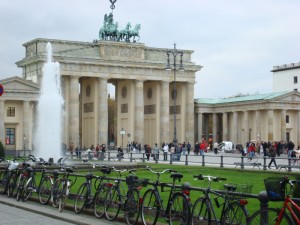 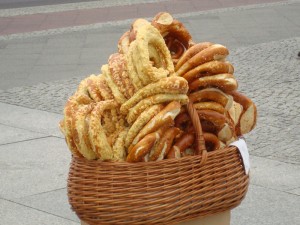 |
Berlin, Germany’s largest city is a dynamic, cosmopolitan and creative capital, allowing for every kind of lifestyle. Located at the boarder between East and West, it is a city of opportunities just waiting to be seized in all areas: entertainment, recreation, economy, science and academic life.
Founded in the 13th century, Berlin has had an eventful history: almost no other city has experienced such frequent, radical changes. Although Berlin saw steady growth in its importance, dazzling epochs alternated with darker eras. Berlin has regarded itself as a city of knowledge and culture since the days of Friedrich the Great in the 18th century, but it is the political and cultural developments of the 19th and 20th century which are more visible throughout Berlin’s cityscape, reflecting both the history of architecture and various approaches to dealing with the consequences of war and destruction. The formerly divided city has succeeded in becoming a vibrant metropolis in the heart of a changing Europe. |
Fact file
|
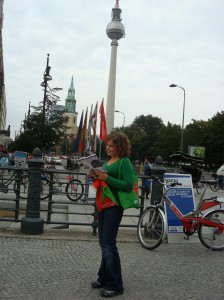 |
Courses
|
 |
Hamburg
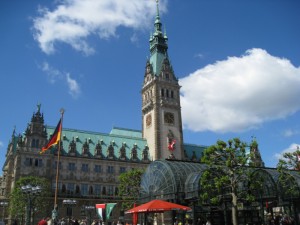 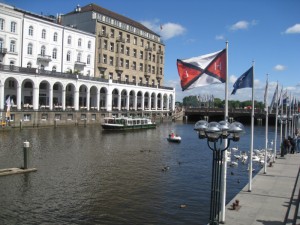 |
The second largest city in Germany, Hamburg has it all: from historical heritage and cultural attractions, to one of the greatest ports in the World and a busy modern lifestyle. The city skyline is dominated by copper spines and domes, from which the city’s symbol St. Michael tower stands out. The city centre’s streets are alternated with canals and bridges. The beautiful Alster Lake and the magestic Rathaus make city’s hearth worth for a picture. Hamburg’s famous fish market is also unique: it sells much more than fish and waits for you every Sunday early morning. Hamburg has also one of the biggest areas of fun in Europe: St. Pauli’s disctrict.
The Great Fire of 1842 and the bombing during World War II caused great loss to the city, but turned it into the merging of styles and senses it is today. Taking advantage of Hamburg’s location, it is also easy to visit Lubeck, Bremen, Schwerin and the North or the Baltic Sea. |
Fact file
|
 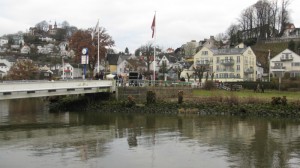 |

Courses
- Group Tuition (year-round)
- Standard Courses: 20 lessons per week/ 1 to 48 weeks/ 15 students max.
- Intensive Courses: 24 lessons per week/ 1 to 48 weeks/ 15 students max.
- Premium Courses: 28 lessons per week/ 1 to 48 weeks/ 15 students max.
- Individual Tuition (year-round)
- Individual Tuition: one-to-one lessons / 4 to 30 lessons per week/ course duration on demand
- Business German: starts every Monday / 4 to 12 lessons per day
- Business German Plus: starts every Saturday / 10 to 12 lessons per day
- Language Programs (year-round)
- Internship Program: 2 to 6 months/ level B1 completed/ language course min. 2 or 4 weeks required
- Teacher Training: Duration of 2 weeks / Starts every Monday/ 26 lessons per week (Socrates program for teachers)
Frankfurt
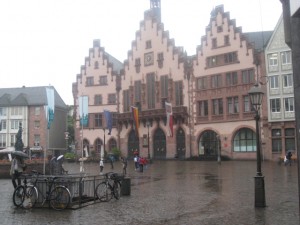 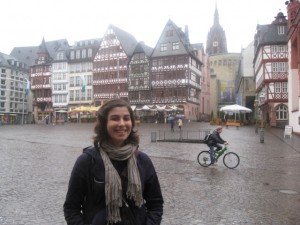 |
The fifth largest city in Germany, Frankfurt is the financial and transportation centre of the country and one of the largest financial centres in Europe. It is the place of residence of the European Central Bank, the German Federal Bank, the Frankfurt Stock Exchange and the Frankfurt Trade Fair. Frankfurt International Airport is one of the world’s busiest airports, Frankfurt Central Station is one of the largest terminal stations in Europe, the Frankfurter Kreuz (Autobahn interchange) is the most heavily used interchange in Europe and it has one of Europe’s most efficient underground transportation systems. The city of Frankfurt was severely bombed in World War II (1939-1945). The once famous medieval city centre, by that time the largest in Germany, was destroyed. Post-war reconstruction took place in a sometimes simple modern style, thus irrevocably changing the architectural face of Frankfurt. However, it is certainly a city where the past meets the future. Looking for a multicultural city? Frankfurt am Main is the right place! |
Factfile
|
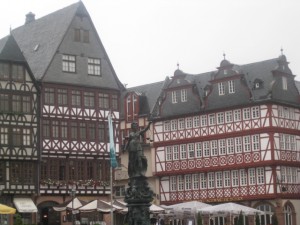 |
Courses
|
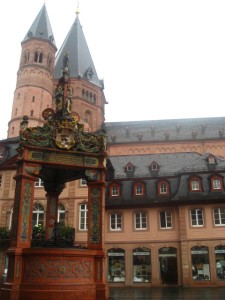 |
Munich
Munich is the capital of the German state of Bavaria and the Germany’s third largest city after Berlin and Hamburg. The city’s name and coat of arms are related to its foundation in 1158, when Guelph Henry the Lion, Duke of Saxony and Bavaria, built a bridge over the river Isar next to a settlement of Benedictine monks. Given the city’s importance, both World Wars affected Munich: World War I brought shortage of goods, political unrest and some damage by bombing; while during World War II the city was very heavily damaged by bombing. After American occupation in 1945, Munich was completely rebuilt following a meticulous and rather conservative plan which preserved its pre-war street grid.
Nowadays, residents of Munich typically enjoy a high quality of life. Public transport is very efficient and the crime rate is very low compared to other large German cities.
Munich is certainly a delightful city: gathering together historical buildings, typical squares and avenues, markets, traditional food and local beer brewers, a great nightlife and house to the famous Oktoberfest.
Factfile
- Age: +17 years old
- School situated in Munich city centre: 15 minutes walking distance to Stachus
- Number of students: 75 (low season)/ 175 (high season)
- Self-Study Center with media and student library
- Multimedia room with 6 computers
- Internet café with 10 computers (registration fee)
- Laptop-cable and Free Wireless LAN network access
- Student office for student cards, maps, etc.
- Students lounge
- Spacious roof terrace with table tennis
- Activity program: City tours, sports and cultural events
- Accommodation: Host Family, Youth Hotel/ Hotel
Courses
- Group Tuition (year-round)
- Standard Courses: 20 lessons per week/ 1 to 48 weeks/ 15 students max.
- Intensive Courses: 24 lessons per week/ 1 to 48 weeks/ 15 students max.
- Premium Courses: 28 lessons per week/ 1 to 48 weeks/ 15 students max.
- Individual Tuition (year-round)
- Individual Tuition: one-to-one lessons / 4 to 30 lessons per week/ course duration on demand
- Business German: starts every Monday / 4 to 12 lessons per day
- Business German Plus: starts every Saturday / 10 to 12 lessons per day
- Language Programs (year-round)
- Internship Program: 2 to 6 months/ level B1 completed/ language course min. 2 or 4 weeks required
- Teacher Training: Duration of 2 weeks / Starts every Monday/ 26 lessons per week (Socrates program for teachers)
Heidelberg : Summer School
Heidelberg is a small typical city in Baden-Württemberg where the past is well preserved. Heidelberg old town, located at the southern side of the river Neckar, is long and narrow and is dominated by the ruins of the Heidelberg Castle. The remains of the Celtic fortress and the Philosophers’ Walk (a scenic walking path overlooking Heidelberg and a famous relic of romantic epoch), on the northern side of the Neckar, are a great place to enjoy the cityscape. Home to one of Europe’s eldest educational institutes, the Ruprecht Karls University (known as the University of Heidelberg), Heidelberg is the right place to spend your summer taking the chance to study German and relax is a very welcoming environment.
Factfile
- Age: +17 years old
- School situated in Heidelberg city centre: 15 min. walking distance to Bismarck-Platz
- Students per class: 15 students max.
- Activity program: city tours, sports and cultural events, weekend excursions
- Spacious Campus-yard
- Accommodation: Host family or Campus (singles rooms)
Courses Levels
- All levels (except beginners)
- Certificate Summer Intensive Course
German for Juniors (Junior All Year-Round Courses):
- Intensive Courses (14 to 17 years)
-
- Course location: Wiesbaden
- Course duration: 2 to 48 weeks
- Levels: all levels
- Course dates: Year-round / starts every Monday
- Number of lessons: 24 lessons per week
- Number of students: 15 students per class max
- Accommodation: Host family with full board
- Preparation Course (14 to 16 years)
-
- Students preparation to attend either a public high school or a private boarding school in Germany
- Course location: Wiesbaden
- Course duration: 5 or 9 months
- Course levels: A2 to B1
- Number of lessons: 30 lessons per week (24 plus 6)
- Number of students: 15 students per class max
- Accommodation: Host family with full board
- Boarding School Program (14 to 16 years)
-
- The opportunity to complete school career in Germany with Secondary School Examination (Abitur), qualifying to a German university
- Course location: Internat bei München
- Course duration: 1 to 4 years
- Number of lessons: 30 to 32 lessons per week
- Accommodation: Campus residence
- High School Program (14 to 17 years)
-
- Course locations: Public German High Schools in Augsburg, Nuremberg, Bayreuth, Potsdam, Hamburg, Kassel, Braunschweig, Oldenburg, Bonn or Siegen
- Course levels: B2 min. required
- Course duration: 1 school year or 1 semester
- Accommodation: Host family in a single room with full board
- Group Stay Program (14 to 18 years)
-
- Taylor made programmes, at any specific date and for any period, for groups
- Number of students in a group: 10 to 60 per group
- Course locations: various locations in Germany
- Course levels: all levels except beginners
- Number of lessons: on request
- Accommodation: Host Family with full board
Junior Summer Courses:
- Standard Courses (12 to 16 years)
-
- Course locations: Aschaffenburg and Lorrach
- Course duration: 2 to 6 weeks
- Course dates: July and August
- Course levels: A2 to C1
- Number of lessons: 15 lessons per week
- Number of students: 15 students max. per class
- Accommodation: Host Family with full board
- Standard Courses (14 to 17 years)
-
- Course locations: Augsburg, Cologne and Nuremberg
- Course duration: 2 to 7 weeks (depending on location)
- Course dates: July and August
- Course levels: A2 to C1
- Number of lessons: 20 lessons per week
- Number of students: 15 students max. per class
- Accommodation: Host Family with full board
- Residence Courses (8 to 14 years)
-
- Course locations: Hochst im Odenwald and Berlin
- Course duration: 2 to 6 weeks
- Course dates: July and August
- Course levels: A2 to C1
- Number of lessons: 20 lessons per week
- Number of students: 15 students max. per class
- Activity Programme: activities and excursions every day of the week
- Accommodation: Junior Residence with full board